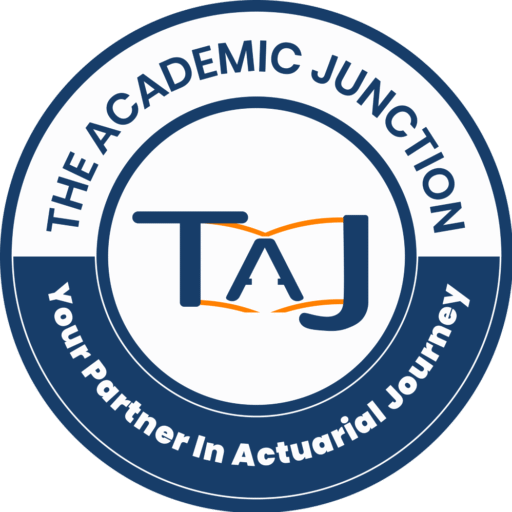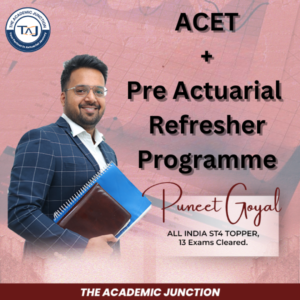Actuary Course 2025: Eligibility, Admissions, Syllabus, & Complete Career Guide

Introduction
In today’s rapidly changing world, uncertainty is inevitable, and actuaries are the experts who quantify risk, forecast financial outcomes, and design strategies to secure the future. Actuarial science is a prestigious field that blends mathematics, statistics, finance, economics, and risk management, making it one of the most analytical and rewarding career paths.
For students in India, the journey into actuarial science typically begins after Class 12. Aspiring actuaries can choose from programs such as a B.Sc. in Actuarial Science, a PG Diploma, an M.Sc., or even an MBA in Actuarial Science. These programs, offered by India’s leading colleges, often require merit-based or entrance-based admissions.
With strong expertise in probability, statistical modelling, and financial analysis, actuaries are in high demand across diverse sectors, including insurance, banking, healthcare, consulting, and fintech. Fresh graduates can expect starting salaries between INR 3.59 LPA and INR 5.50 LPA, while experienced professionals can earn as much as INR 43 LPA or more.
Actuarial science combines mathematics, statistics, finance, economics, and risk management to assess and manage uncertainty, especially in insurance. With the general insurance sector growing at a Compound Annual Growth Rate (CAGR) of $6.2\%$ (2019–2023), the demand for actuaries remains strong. Beyond traditional roles, the analytical skills gained in an actuary course open doors to careers such as financial consulting, accounting, and risk analysis.
1. Actuarial Science: Quick Facts
| Category | Details |
|---|---|
| Primary Industry | Finance and Insurance |
| Actuary Course Duration | Undergraduate route (3–4 years); Postgraduate route (1–2 years) |
| Academic Eligibility | 12th Standard (Science/Commerce with Math/Stats) or UG in Actuarial Science |
| Actuarial Science Salary (Starting) | INR 3.59 LPA – 5 LPA |
| Prominent Recruiters | ICICI Lombard General Insurance, Mercer, Aon, Willis Towers Watson, Milliman |
2. What is an Actuary?
An actuary meaning is a financial professional who applies mathematics, statistics, and economics to evaluate and manage risk. In the field of actuarial science, actuaries use data-driven models to predict future events and guide organizations in making informed financial decisions.
Actuaries play a crucial role in insurance, finance, healthcare, and consulting, ensuring stability and profitability in uncertain market conditions. Pursuing a career in actuarial science offers strong growth opportunities for individuals who excel in analytical thinking and problem-solving.
3. Types of Actuaries in India: Career Roles and Responsibilities
| Actuary Type | Specialization | Role and Responsibilities |
|---|---|---|
| Life Actuary | Life Insurance, Annuities | Designs and prices life insurance and annuity policies by analyzing mortality and longevity data. |
| Health Actuary | Health Insurance, Employee Benefits | Predicts healthcare costs to develop and price health insurance plans, including disability and long-term care coverage. |
| Property and Casualty (P&C) Actuary | Auto, Home, Commercial Insurance | Analyzes risks from accidents and natural disasters to set policy premiums and maintain profitability. |
| Pension Actuary | Retirement Plans, Pensions | Evaluates and manages pension schemes to ensure they remain financially secure for retirees. |
| Enterprise Risk Management (ERM) Actuary | Corporate Risk Management | Identifies, measures, and mitigates risks across financial, operational, and strategic areas. |
| Consulting Actuary | Multiple Industries | Provides expert advice on pension plans, insurance, and risk management to various clients. |
| Investment Actuary | Investment Strategies, Asset Management | Analyzes market trends and helps manage investment portfolios to optimize returns. |
| Government Actuary | Social Programs, Public Policy | Assesses the financial sustainability of public schemes like social security and healthcare programs. |
4. Why Pursue Actuarial Science? Benefits and Market Demand
Actuaries are in high demand globally, particularly in the insurance and financial services industries. The constant need for professionals who can assess and manage risk translates into job security and a steady demand for actuarial abilities. Actuaries are also among the highest-paid employees in the financial industry; their highly valued skills in risk management typically result in outstanding salaries and benefits.
5. Actuarial Science Course Eligibility Criteria 2025
Eligibility for actuarial science courses in India depends on the program level and admission route.
| Level | Eligibility Criteria |
|---|---|
| UG (Undergraduate) | Completed Class 12 with Mathematics as a compulsory subject (Commerce/Science/Arts). Minimum 50% marks in some institutes. Admission via merit or college-specific entrance exams. |
| PG (Postgraduate) | Bachelor’s degree in Commerce/Science/Related field with Mathematics and Statistics as core subjects. Minimum 50% aggregate marks. |
| ACET Route | Pass the Actuarial Common Entrance Test (ACET) conducted by the Institute of Actuaries of India (IAI). The online exam is 3 hours long and consists of 70 MCQs across sections like Mathematics, Statistics, Data Interpretation, English, and Logical Reasoning. Minimum qualifying marks: 50%. |
| Non-ACET Route | Qualified member of ICAI/ICMAI/ICSI; MBA in Finance (≥ 60%); Graduate from IIM/IIT; BSc/MSc in Actuarial Science; BE from a reputed institute (≥ 60%); Passed actuarial exams from IfoA/SOA/CAS/ASSA/IAAust; Relevant diplomas/degrees such as BStat (Hons), BMath (Hons), MStat, MMath from recognized institutes. |
6. Actuarial Science Courses After 12th and Beyond
The path to becoming an actuary in India typically involves a combination of academic degrees and professional certifications.
6.1. Undergraduate Level Pathways
For students who have just completed their Class 12 board exams:
- B.Sc. in Actuarial Science: A dedicated degree focusing entirely on actuarial principles, mathematics, and statistics.
- B.Com with Actuarial Science: A commerce degree with a specialization or electives in actuarial subjects.
- B.A./B.Sc. in Mathematics, Statistics, or Economics: These degrees provide a strong quantitative foundation and are excellent starting points for later professional actuarial exams.
Most undergraduate admissions are based on merit (Class 12 scores) and/or performance in university-specific entrance exams.
Also Read :- https://theacademicjunction.co.in/career-opportunities-in-actuarial-science/
6.2. Postgraduate and Professional Pathways
For graduates or professionals looking to specialize:
- PG Diploma in Actuarial Science: A focused one or two-year program for graduates.
- M.Sc. in Actuarial Science: A master’s degree offering an in-depth study of actuarial principles.
- MBA in Actuarial Science: Combines business management with actuarial expertise, often preferred for leadership roles.
- Professional Certification Exams (IAI): Many aspiring actuaries pursue professional qualifications from bodies like the Institute of Actuaries of India (IAI), passing a series of tough exams (e.g., ACET, followed by Core Principles, Core Practices, Specialist Principles, and Specialist Advanced exams). These certifications are crucial for becoming a fully qualified Actuary.
7. Required Skill Set for Actuarial Science
Actuarial science is a demanding field that requires a diverse set of skills to lead teams and manage complex projects effectively:
- Problem Solving Skills: Actuarial specialists evaluate complex data, detect patterns, and devise strategies to mitigate unwanted outcomes, making analytical comprehension essential.
- Mathematical Brilliance: Actuaries constantly work with numbers. Comfort with calculus, statistics, and probability, along with advanced knowledge of statistical analysis, is necessary.
- Technical Knowledge: Proficiency in statistical software, advanced knowledge of Microsoft Excel, and familiarity with a statistical programming language contribute to strong computer skills.
- Knowledge of Business and Finance: Understanding financial and investing markets, including skills like valuation and pricing for insurance products, is vital for advising on minimizing financial losses and maximizing returns.
- Communication and Interpersonal Skills: Actuaries must have excellent communication skills to translate complex business and finance concepts into simpler language for clients, businesses, and the general public.
Also Read :- https://theacademicjunction.co.in/key-to-success-in-the-actuarial-profession/
8. Scope of Actuarial Science in India and Abroad
Actuarial science offers a promising career path globally, driven by the growing demand for risk management professionals.
| Scope | Details |
|---|---|
| Scope in India | Expanding economy and a growing insurance sector is increasing demand. Only $\sim 8,104$ actuaries for $1.3$ billion people indicates high demand. Hiring is projected to grow $9\%$ in 2025. Roles span insurance, pensions, risk management, and financial consultancy. |
| International Scope | Developed economies have a strong demand. International credentials like Chartered Enterprise Risk Actuary (CERA) enhance global career opportunities, enabling work in major financial hubs. |
| Future Trends | AI, machine learning, and data analytics are transforming actuarial roles. The growth of fintech, climate risk, and cybersecurity increases demand. The U.S. Bureau of Labor Statistics (BLS) projects $22\%$ job growth (2023-2033), with “Actuary” being a top career choice for 2025. |
| Career Outlook | High employability with strong starting salaries. Diverse career roles: actuaries, accountants, financial analysts, risk consultants. Opportunities are available both in India and abroad. |
9. Actuarial Science Course Fees in India
Course costs vary based on the level of study, institution, and mode of education.
Undergraduate Courses (After 12th)
| Course | Average Annual Fees | Institutions |
|---|---|---|
| B.Sc. in Actuarial Science | ₹42,000 – ₹3.9 lakh | Amity University, YCMOU Nashik, North Maharashtra University, Bishop Heber College |
| B.Com. in Insurance & Actuarial Studies | ₹1.2 lakh – ₹1.8 lakh | Administrative Management College, Maharishi University of Information Technology |
| B.Sc. in Statistics/Mathematics | ₹1.33 lakh – ₹3.36 lakh | North Maharashtra University, YCMOU Nashik |
Actuary Course Fees for Postgraduate
| Course | Average Annual Fees | Institutions |
|---|---|---|
| M.Sc. in Actuarial Science | ₹3,360 – ₹4.84 lakh | Kerala University, Christ University, B.S. Abdur Rahman Crescent Institute |
| MBA in Insurance & Risk Management | ₹1.4 lakh – ₹4.84 lakh | Kalasalingam Academy of Research and Education, Christ University |
| PG Diploma in Actuarial Science | ₹23,100 – ₹1.8 lakh | Bishop Heber College, Maharishi University of Information Technology |
Actuarial Science Exams Fees (IAI)
| Exam Level | Fee (INR) |
|---|---|
| Core Principles | ₹5,000 |
| Business Finance | ₹3,000 |
| Actuarial Practice | ₹8,000 |
| Modelling Practice | ₹10,000 |
10. Actuarial Science Entrance Exams 2025
The Actuarial Common Entrance Test (ACET) is the primary gateway for professional actuarial qualification in India.
10.1 Actuarial Common Entrance Test (ACET) Details
| Exam Detail | Information |
|---|---|
| Conducting Body | Institute of Actuaries of India (IAI) |
| Mode of Exam | Online (computer-based) |
| Duration | 3 hours (180 minutes) |
| Question Type | Multiple Choice Questions (MCQs) |
| Total Questions | 70 |
| Sections | Mathematics (30 marks), Statistics (30 marks), Data Interpretation (15 marks), English (15 marks), Logical Reasoning (10 marks) |
| Qualifying Marks | Minimum 50% |
| Frequency | 3 times a year (March, July, December) |
| Purpose | First step toward becoming a student member of IAI and eventually a fully qualified actuary. |
11. Actuary Syllabus (IAI Certified)
The professional actuarial science syllabus is structured into four major sections, equipping students with expertise in mathematics, statistics, finance, economics, and risk management.
| Section | Subjects / Papers |
|---|---|
| Core Principles (CS, CM, CB) | CS1: Actuarial Statistics; CS2: Risk Modelling & Survival Analysis; CM1: Actuarial Mathematics for Modelling; CM2: Economic Modelling; CB1: Business Finance; CB2: Business Economics; CB3: Business Management |
| Core Practices (CP) | CP1: Actuarial Practice; CP2: Modelling Practice; CP3: Communications Practice |
| Specialist Principles (SP) | SP1: Health & Care; SP2: Life Insurance; SP4: Pensions & Other Benefits; SP5: Investment & Finance; SP6: Financial Derivatives; SP7: General Insurance – Reserving & Capital Modelling; SP8: General Insurance – Pricing; SP9: Enterprise Risk Management |
| Specialist Advanced (SA) | SA1: Health & Care; SA2: Life Insurance; SA3: General Insurance; SA4: Pensions & Other Benefits; SA7: Investment & Finance |
Courses to explore in Actuarial Science
ACET + Pre Actuarial Refresher Programme
Original price was: ₹20,000.00.₹10,000.00Current price is: ₹10,000.00.Pre Actuarial Refresher Programme
Original price was: ₹12,000.00.₹5,000.00Current price is: ₹5,000.00.Basic R
Original price was: ₹4,000.00.₹2,000.00Current price is: ₹2,000.00.CB1
₹10,000.00 – ₹13,500.00CB1 (Full English Course)
Original price was: ₹25,000.00.₹20,000.00Current price is: ₹20,000.00.CB1 + CB2
₹18,000.00 – ₹25,000.00CB1 Test Series
Original price was: ₹7,000.00.₹4,000.00Current price is: ₹4,000.00.CB2
₹10,000.00 – ₹13,500.00CB2 (Full English Course)
Original price was: ₹25,000.00.₹20,000.00Current price is: ₹20,000.00.CB2 Test Series
Original price was: ₹7,000.00.₹4,000.00Current price is: ₹4,000.00.CM1
₹23,000.00 – ₹27,500.00CM1 (Full English Course)
Original price was: ₹40,000.00.₹35,000.00Current price is: ₹35,000.00.12. Actuarial Science Careers Scope: Job Profiles, Salary, and Top Recruiters
Graduates enter a profession with stable employment, high demand, and excellent earning potential.
12.1. Actuary Jobs, Roles, and Descriptions
| Role | Description |
|---|---|
| Actuarial Analyst | Experts who analyze data to identify risk and estimate financial outcomes across various industries. |
| Life Insurance Actuary | Specializes in evaluating and managing risks associated with life insurance policies, annuities, and pensions. |
| Pension Actuary | Focuses on retirement programs and benefits, advising on plan design, funding, and regulatory compliance. |
| Investment Actuary | Advises firms on investment decisions by assessing the financial risks associated with various investment strategies. |
| Risk Management Actuary | Works to identify, evaluate, and minimize financial risks across an organization. |
| Other Related Roles | Accountants and Auditors, Budget Analysts, Cost Estimators, Economists, Financial Analysts, Insurance Underwriters, and Mathematicians. |
Also Read :- https://theacademicjunction.co.in/roles-of-an-actuary/
12.2. Top Recruiters in the Actuarial Science Sector
Top companies in insurance, consulting, and finance actively recruit qualified professionals, including:
Prudential, Max Bupa Health Insurance, EY, PwC Actuarial Services India, Deloitte, KPMG, Liberty Mutual, The Travelers, The Hartford, ING, Allstate, Nationwide, Aon Hewitt, Marsh McLennan, Milliman, Ageas Federal, Kotak Mahindra Life Insurance, ACIES, Edelweiss, KNAV.
12.3. Actuary salary in india
| Name of Organisation | Average Annual Actuary Salary (INR) |
|---|---|
| Government | ₹5.13 Lakhs |
| Private | ₹9 Lakhs |
12.4. Salary by Experience and Specialization
| Specialization | Average Annual Salary (INR) |
|---|---|
| Actuarial Product Manager | ₹10 Lakhs |
| Financial Adviser | ₹8 Lakhs |
| Consultant | ₹15 Lakhs |
| Senior Executive Actuarial | ₹20 Lakhs |
| Actuarial Analyst | ₹13 Lakhs |
| Actuarial Associate | ₹10 Lakhs |
12.5 Actuarial science salary
| Experience | Average Annual Salary (INR) |
|---|---|
| Fresher | ₹4 Lakhs |
| Experienced | ₹17 Lakhs |
Also Read :- https://theacademicjunction.co.in/salary-of-an-actuary-in-india/
13. Actuary vs CA
| Factor | Actuary | Chartered Accountant (CA) |
|---|---|---|
| Primary Focus | Quantifies, assesses, and manages financial risk using advanced mathematics and statistics. | Manages financial records, conducts audits, provides tax consultation, and ensures compliance with financial regulations. |
| Typical Industries | Insurance, pension funds, investment banking, and financial services. | Public accounting firms, corporations, government, finance, and virtually all industries. |
| Skills Required | Mathematics, statistics, data analysis (Python, R), and commercial awareness. | Financial accounting, auditing, taxation, attention to detail, and knowledge of tools like Tally and SAP. |
| Qualification Process | A series of rigorous exams (up to 15 in India) through the IAI, taking around 5–7 years. | Foundation, Intermediate, and Final exams with a mandatory 3-year articleship (practical training). |
| Duration of Qualification | 5–7 years due to multiple exams and low pass rates. | Typically 4–5 years, depending on exam clearance. |
| Entry Salary | High — ₹10–15 LPA for freshers. | Competitive — ₹6–12 LPA for freshers. |
| Career Trajectory | High earning potential with advancement to senior roles like Chief Risk Officer (CRO). | Diverse paths: Finance Manager, Partner, CFO. |
| Global Scope | High demand worldwide; certifications recognized internationally. | Strong international demand; additional qualifications like CPA or ACCA enhance global opportunities. |
14. Institute of Actuaries of India (IAI) Membership
Membership in the IAI is a key requirement for employment in many Indian organizations and can be pursued through the ACET route or the Non-ACET route (for those with specific global actuarial qualifications).
Membership Levels:
| Membership Level | Requirements |
|---|---|
| Student Member | Pass the ACET exam. |
| Associate Member (AIAI) | Pass 10 professional actuarial exams and complete required work experience. |
| Fellow Member (FIAI) | Pass all 15 professional actuarial exams and meet experience requirements. |
| Affiliate Member | For professionals involved in actuarial work without pursuing a full qualification. |
Benefits of IAI Membership:
- Industry recognition and credibility.
- Eligibility for higher-level actuarial roles.
- Access to professional resources, events, and global actuarial networks.
- Greater employability and career growth potential.
Add button https://theacademicjunction.co.in/institute-and-faculty-of-actuaries/
14. Conclusion
Academic Junction Institute provides comprehensive programs that equip students with the essential skills and knowledge required to succeed in the complex fields of risk management and financial analysis. With our experienced faculty and real-world learning opportunities, we prepare graduates to meet industry demands. Join us and become part of a thriving community committed to academic excellence and a rewarding profession. Enquire about our Actuary Course courses for 2025 now and take the final step towards becoming a successful actuary.
15. Frequently Asked Questions (FAQ):
1. What are the basics of Actuarial Science?
Actuarial science is a discipline that assesses financial risks in the insurance and finance fields, using mathematical and statistical methods. It applies the mathematics of probability and statistics to define, analyze, and solve the financial implications of uncertain future events.
2. How many subjects can I attempt in one examination cycle?
There is no limit; students can register for multiple exams in an exam session, provided they do not fall on the same date and time.
3. What is the biggest challenge for actuaries?
The biggest challenge for actuaries is adapting to rapid changes in data, technology, and regulations while accurately predicting financial risks in an uncertain world. They must continuously update their skills in analytics and communication to stay relevant and effective.
4. What type of problems do actuaries solve?
Actuaries typically compile and analyze statistical data, estimate the probability and likely economic cost of an event such as death, sickness, an accident, or a natural disaster, and design strategies to mitigate these risks.
5. What is the future of actuaries?
The future is strong. According to the U.S. Bureau of Labor Statistics, employment of actuaries is projected to grow 22% from 2023 to 2033, much faster than the average for all occupations. The growth of data science and risk in new areas further enhances this outlook.
6. Is it worth studying Actuarial Science in India?
Yes. Actuaries play an important role in evaluating and managing financial risks, and the demand for qualified actuaries is expected to expand in India’s developing insurance and financial sectors. You should consider factors such as educational quality, job opportunities, and professional certification paths when making your decision.
7. How many exams do we have to take to become an Actuary in India?
To become a fully qualified Fellow Actuary in India through the IAI, you must pass 15 professional actuarial exams (including Core Principles, Core Practices, Specialist Principles, and Specialist Advanced).
8. Can I pursue an actuary course under an MBA degree?
Yes, it is possible to pursue an MBA in Actuarial Science or a related field like Insurance and Risk Management. To do this, you typically have to clear a Management Entrance Exam.












